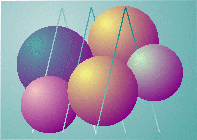




|
Neuro-Fuzzy Systems |

|
Uncertainty in Knowledge Based Systems |


|

Neural Networks and Fuzzy Systems
Fuzzy Data Analysis |

|

In our group we work on data analysis and image analysis with fuzzy clustering methods. A cluster analysis is a method of data reduction that tries to group given data into clusters. Data of the same cluster should be similar or homogenous, data of disjunct clusters should be maximally different. Assigning each data point to exactly one cluster often causes problems, because in real world problems a crisp separation of clusters is rarely possible due to overlapping of classes. Also there are usually exceptions which cannot be suitably assigned to any cluster. For this reason a fuzzy cluster analysis specifies a membership degree between 0 and 1 for each data sample to each cluster.
Most fuzzy cluster analysis methods optimize a subjective function that evaluates a given fuzzy assignment of data to clusters. By suitable selection of parameters of the subjective function it is possible to search for clusters of different forms: on the one side solid clusters in form of (hyper-dimensional) solid spheres, elliptoids or planes, and on the other side shells of of geometrical contures like circles, lines, or hyperboles (shell cluster). Latter are especially suitable for image analysis. From the result of a fuzzy cluster analysis a set of fuzzy rules can be obtained to describe the underlying data. These rules can be used to build fuzzy systems like fuzzy classifiers or fuzzy controllers, for example.
The fuzzy cluster analysis methods examined by us have been implemented in the tool FCLUSTER.

If you want to know more about our work please have a look at our list of our books , or choose a paper from our list of papers (with abstracts) and download it.
For further information please contact Christian Döring or Rudolf Kruse.
